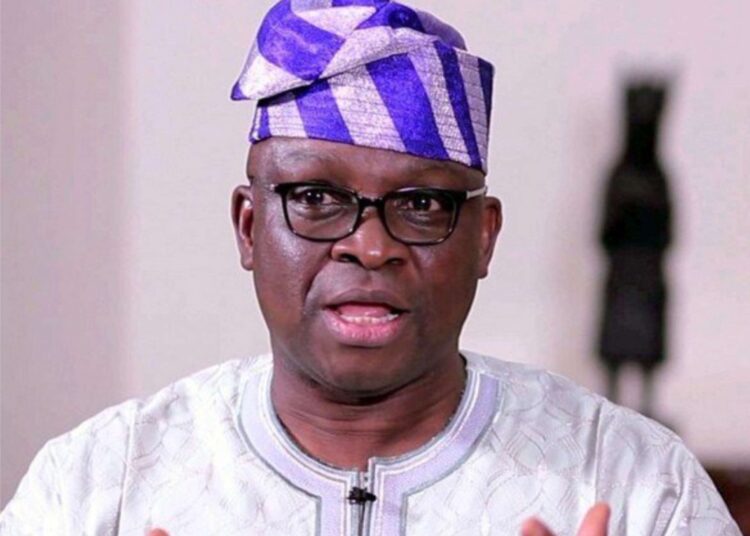After close to seven years of trial, former governor of Ekiti State, Ayodele Fayose, will on Tuesday, July 15, know his fate in the case of alleged N6.9bn fraud filed against him by the Economic and Financial Crimes Commission (EFCC), as Justice Chukujekwu Aneke of a Federal High Court, sitting in Ikoyi, Lagos, will rule on the ‘no case submission’ made by Fayose’s counsel.
Ruling on the no-case submission, which was earlier scheduled for July 10, 2025, and was moved to July 15, owing to the absence of the Judge.
Fayose, who is standing trial alongside his company, Spotless Investment Limited, is facing an 11-count charge brought against him by the EFCC. The EFCC had alleged that Fayose received N1.2bn to finance his 2014 election campaign and took $5m in cash from a former Minister of State for Defence, Senator Musiliu Obanikoro, bypassing financial institutions.
At the last adjourned date on May 19, 2025, counsel to the defendants argued the no-case submission dated May 16, 2025 and further submitted that the prosecution had failed to establish a prima facie case against his client. He told the court on that; “all the witnesses that testified for the prosecution (EFCC), including the exhibits tendered were based on mere speculations, which would not warrant the Defenfants’ evidence,” urging the Court to uphold the “no case submission” of their clients.
While Chief Kalu Agabi (SAN), a former Attorney General of the Federation, represented Fayose, Olalekan Ojo (SAN) reprsented Spotless Investment Limited, joined as the second defendant.
Agabi, who also pointed out that a central figure in the alleged transactions, Abiodun Agbele, was not charged alongside Fayose, said; “The predicate offences on which these charges are based do not hold water,” Agabi said. “Criminal breach of trust and conspiracy are distinct charges, and no co-conspirator was docked with the defendant.”
The second defence counsel, Ojo, adopted the no-case submission filed on March 21, 2025, and supported by further documents on May 16.
He argued that the credibility of the prosecution’s 13th witness, former Minister of State for Defence, Senator Musiliu Obanikoro, had been seriously eroded.
Ojo noted that Obanikoro had admitted under cross-examination that there was no direct communication between Fayose and the former National Security Adviser, Col. Sambo Dasuki, undermining the prosecution’s narrative.
In response, EFCC prosecutor, Rotimi Jacobs (SAN), urged the court to dismiss the no-case submissions.
He cited a counter-affidavit and written address dated May 8, 2025, arguing that the defendants had failed to explain suspicious financial transactions.
Jacobs questioned why Fayose did not use his personal bank account for the transactions if they were legitimate.
He cited the testimony of EFCC investigator Abubakar Madaki, who stated that Fayose used associates to purchase properties both in Nigeria and abroad — associates who later denied ownership of the properties, even though Fayose had claimed them in his statement.
Recall that Fayose was initially arraigned on October 22, 2018, before Justice Mojisola Olatoregun, who later retired from judicial service.
However, after calling more than 10 witnesses, EFCC wrote a petition against the judge, accusing her of bias.
In the petition dated March 21, 2019 and signed by the then acting Chairman, Mr Ibrahim Magu, EFCC asked the Chief Judge of the Federal High Court then, Justice Adamu Abdu-Kafarati to transfer the trial to another judge.
The case was subsequently reassigned to Justice Aneke.
Justice Aneke, who had earlier fixed July 10 for his ruling on the no case submission, was absent on that date due to official engagements. The court’s ruling, which will be delivered on Tuesday, will determine whether Fayose will open his defence or be freed from the allegations.
We’ve got the edge. Get real-time reports, breaking scoops, and exclusive angles delivered straight to your phone. Don’t settle for stale news. Join LEADERSHIP NEWS on WhatsApp for 24/7 updates →
Join Our WhatsApp Channel










